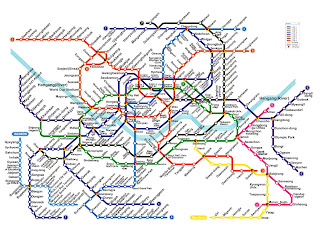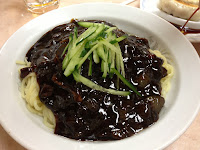Learning a new language introduces lots of new challenges, especially one as different from English as Korean, which has been ranked one of the top 4 most difficult languages for native English speakers to learn. These challenges can be frustrating when you suddenly learn there are many exceptions to a grammar rule you thought was simple, and enjoyable when successfully communicate directions to your home to the taxi driver. Other times it can be funny or just interesting how things translate differently in another language. Here are a few examples of some of the language differences between English and Korean that I find funny or interesting:
| Some notes from an attempted language exchange |
"I'm sorry"
This is one of the first words learned in any new language, and so might be surprising that it could cause any confusion any language. However, whereas in english "sorry" expresses a feeling of sympathy or regret for another person's misfortunes, in Korean it is only used when the speaker is the cause of the misfortune. More simply, "sorry" in English is used both for offering an apology or condolence, but in Korean it is only used as an apology.
For example, if someone accidentally bumps into you, then it is expected that that person would say, "I'm sorry" whether it be in English or Korean (unless it is a Korean ajumma. In that case it was likely intentional). On the other hand, if your friend laments to you that their grandmother just passed away, it is totally acceptable for someone to say, "I'm sorry" in English as they are expressing a feeling of sympathy for your loss. However, in Korea to say "죄송합니다" ("I'm sorry") would cause confusion and could be interpreted as if you killed your friend's grandma.
Answering Negative Questions
This is one that made me realize how confusing English can be. Take a second and think to yourself about how you respond to a negative question, such as, "are you not hungry?"
In English, whether you simply answer with a "yes" or a "no" to this question, it would be understood that you are in fact not hungry. To Koreans it works like a math problem. A negative plus a negative makes a positive and a negative plus a positive stays negative. So, if asked, "are you not hungry?" and you are in fact hungry then you should answer "no" making the statement positive, or "I am hungry". If you are indeed not hungry a simple "yes" is all that is needed in response. Simple and makes a lot more sense.
Some words in Korean just have funny or strange literal translations, when translated directly into English. English has these too, but we just rarely think about them and accept them as the word. For example, jellyfish and butterflies are pretty strange when you think about it.
Likewise, there are a few Korean words that also have funny, or at least interesting, literal meanings. The first is the korean word for mustache, which is 코수염 (ko soo yeom), and translates directly to "nose beard". This such a perfect description of what a mustache is that I am in favor of changing the English word to nose-beard. I hereby propose that all mustaches hence forward be referred to only as nose-beards!
Another example is the word for blister, which is 물집 (mool jib), and translates to "water house". I guess you can think of a blister as a little house containing water, but seems like a strange way to describe it.
This last example comes with a story. When I was first visiting Korea back in the winter of 2013, I was nearing the end of my trip and I hadn't eaten much Korean food, which was unacceptable. Too unfamiliar with the language and too afraid to just point to something on a menu and hope for the best, I needed some guidance on what to eat. So on my last night, I decided to ask a stranger on the street to suggest me something to eat. The first people I stopped were two cute girls (yes their appearance may have had a little something to do with why I chose them). I simply explained, in English at this time, that I wanted to eat some Korean food and if they knew any place nearby. To may amazement, they invited me to join them for dinner as they were on their way to eat Korean food. *Sidenote: can honestly say that it was interactions like this, and this was not the only one that trip, that made me move to Korea! Now back to the story* Completely trusting my new friends, I let them order whatever they wanted and told them anything was okay. Only after the food arrived, and having already eaten it, did I think it necessary to ask what it was. Looking confused as she struggled to come up with the English word, she pointed to her stomach and said "shit house. Chicken shit house". Of course at the time I found this both a hilarious and repulsive translation (the visual imagery was not pleasant having already eaten it) of what I interpreted to be chicken intestines. Only recently did I discover that this is the actual translation from Korean for chicken gizzard, which is 닭똥집 or so elequantly put, "chicken shit house".
Every language and every generation has its own slang. Just in my life time something that you want to describe as nice or cool has gone from: "rad", to "hip", to "da bomb", to "boss" or "beast, to "swag", to "on fleek", to now "lit". Here are few slang words I have picked up in Korea:
노잼 (No-Jam)
This slang actually combines both English and part of a Korean word. It takes the "노" (no) from the English word "no" and adds it to 잼 (jam), which is the front part of 재밌어요 (jae mee suh yo), meaning fun, to create "노잼" which means something is lame or really not fun.
화이팅 (hwa-ee-ting)
This is just a Konglish (Korean+English) version of the word "fighting". You may think it sounds nothing similar to "fighting", but you must realize that there is no f-sound in Korean, so this is how they compensate. What makes this word slang, is not the word itself, but rather how it is used. Koreans will say "화이팅!" as a cheer of encouragement similar to "cheer up!' or "you can do it!". So to all my readers out there, 화이팅!
불금/월요병 (bul-gum/wohl-yo-byung)
These two terms help express most people's feelings on both the days that bookend the weekend; Friday and Monday. 불금 (bul-gum) translates to "fire Friday", which kind of indicates it is going to be a hot or lit day. The flip side of that then comes on Monday, which Koreans express as 월요병 (wohl-yo-byung). The 월요 comes from 월요일, meaning Monday, and the 병 means sickness. Combined they form the word "Monday sickness", or what we would say in English as "having a case of the Monday's".
술고래 (sool-go-lae)
This last example of Korean slang just has a funny translation and is an interesting way to describe what it is. 술 (sool) in Korean means alcohol and 고래 (go-lae) means whale, so can you guess what 술고내 means??
Koreans use 술고래 to describe a person who can drink well. Or in other words, a person who can drink a lot without getting drunk. Don't ask how I learned this word 😉

























